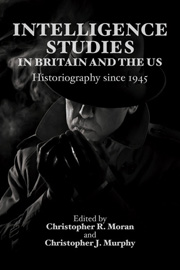Book contents
- Frontmatter
- Contents
- The Editors
- The Contributors
- List of Figures
- Preface
- Acknowledgements
- Introduction: Intelligence Studies Now and Then
- Part I AMERICAN INTELLIGENCE HISTORIOGRAPHY
- 1 CIA History as a Cold War Battleground: The Forgotten First Wave of Agency Narratives
- 2 The Culture of Funding Culture: The CIA and the Congress for Cultural Freedom
- 3 ‘Real Substance, Not Just Symbolism’? The CIA and the Representation of Covert Operations in the Foreign Relations of the United States Series
- 4 Bonum Ex Malo: The Value of Legacy of Ashes in Teaching CIA History
- 5 Narrating Covert Action: The CIA, Historiography and the Cold War
- 6 FBI Historiography: From Leader to Organisation
- 7 Reconceiving Realism: Intelligence Historians and the Fact/Fiction Dichotomy
- 8 The Reality is Stranger than Fiction: Anglo-American Intelligence Cooperation from World War II through the Cold War
- Part II BRITISH INTELLIGENCE HISTORIOGRAPHY
- Index
2 - The Culture of Funding Culture: The CIA and the Congress for Cultural Freedom
from Part I - AMERICAN INTELLIGENCE HISTORIOGRAPHY
Published online by Cambridge University Press: 05 October 2013
- Frontmatter
- Contents
- The Editors
- The Contributors
- List of Figures
- Preface
- Acknowledgements
- Introduction: Intelligence Studies Now and Then
- Part I AMERICAN INTELLIGENCE HISTORIOGRAPHY
- 1 CIA History as a Cold War Battleground: The Forgotten First Wave of Agency Narratives
- 2 The Culture of Funding Culture: The CIA and the Congress for Cultural Freedom
- 3 ‘Real Substance, Not Just Symbolism’? The CIA and the Representation of Covert Operations in the Foreign Relations of the United States Series
- 4 Bonum Ex Malo: The Value of Legacy of Ashes in Teaching CIA History
- 5 Narrating Covert Action: The CIA, Historiography and the Cold War
- 6 FBI Historiography: From Leader to Organisation
- 7 Reconceiving Realism: Intelligence Historians and the Fact/Fiction Dichotomy
- 8 The Reality is Stranger than Fiction: Anglo-American Intelligence Cooperation from World War II through the Cold War
- Part II BRITISH INTELLIGENCE HISTORIOGRAPHY
- Index
Summary
The Congress for Cultural Freedom (CCF) was the largest and longest of the covert operations run by the Central Intelligence Agency (CIA). Lasting from 1950 until 1967, the purpose of the CCF was to promote an international anti-communist consciousness among intellectual liberals and non-communist Leftists. The CCF established organisations throughout the non-communist world, sponsoring concerts, art exhibits and scholarly lectures to promote anticommunist activism among intellectuals and artists. From 1966 to 1967, The New York Times and Ramparts – a New Left magazine that offered criticism of politics and culture – exposed the ‘secret’ that the CIA had covertly funded the CCF since its establishment in 1950. Within months of breaking this scandal, the CCF could not withstand the blow to its reputation and ceased functioning as an effective organisation.
The circuitous and exciting story of the relations between the CIA and the CCF has been discussed in detail by a relatively small number of historians, which are discussed below. These historians have been limited in their ability to explore the topic fully, because the CIA's documents regarding covert funding of the CCF remain closed. The CIA's history of pathological secrecy is ‘old hat’, but its routine obstructionism continues to rankle historians. Despite changing its mind in May 2012, in September 2011, the CIA decreed:
that declassification reviews would now cost requesters up to $72 per hour, even if no information is found or released. To even submit a request – again, even if no documents are released – the public must now agree to pay a minimum of $15.
- Type
- Chapter
- Information
- Intelligence Studies in Britain and the USHistoriography since 1945, pp. 47 - 64Publisher: Edinburgh University PressPrint publication year: 2013

